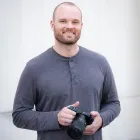January 10, 2022
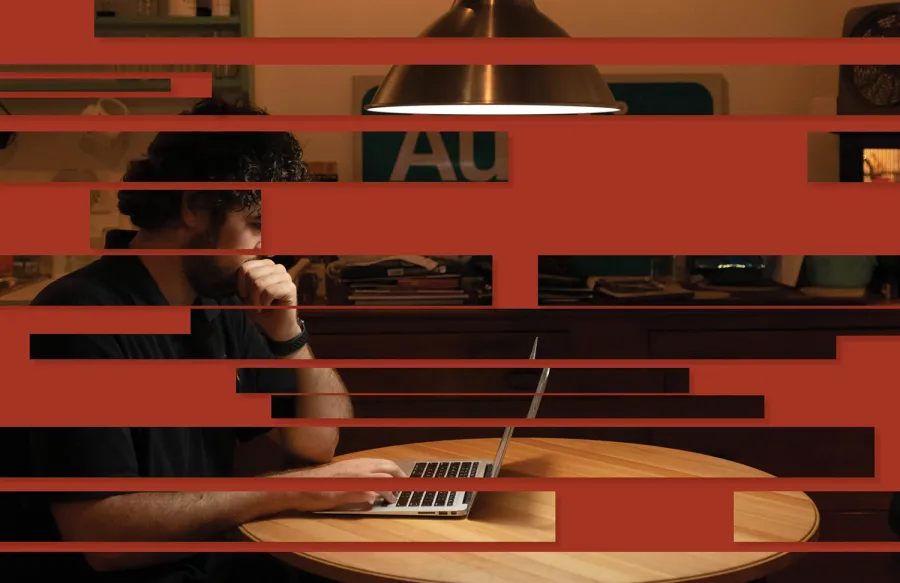
How students and faculty adapted to a year of remote learning
My Little Ethnomusicologist
How DMA Ethnomusicology Candidate Heather Couture Tackled Coursework While Raising Her First Child.
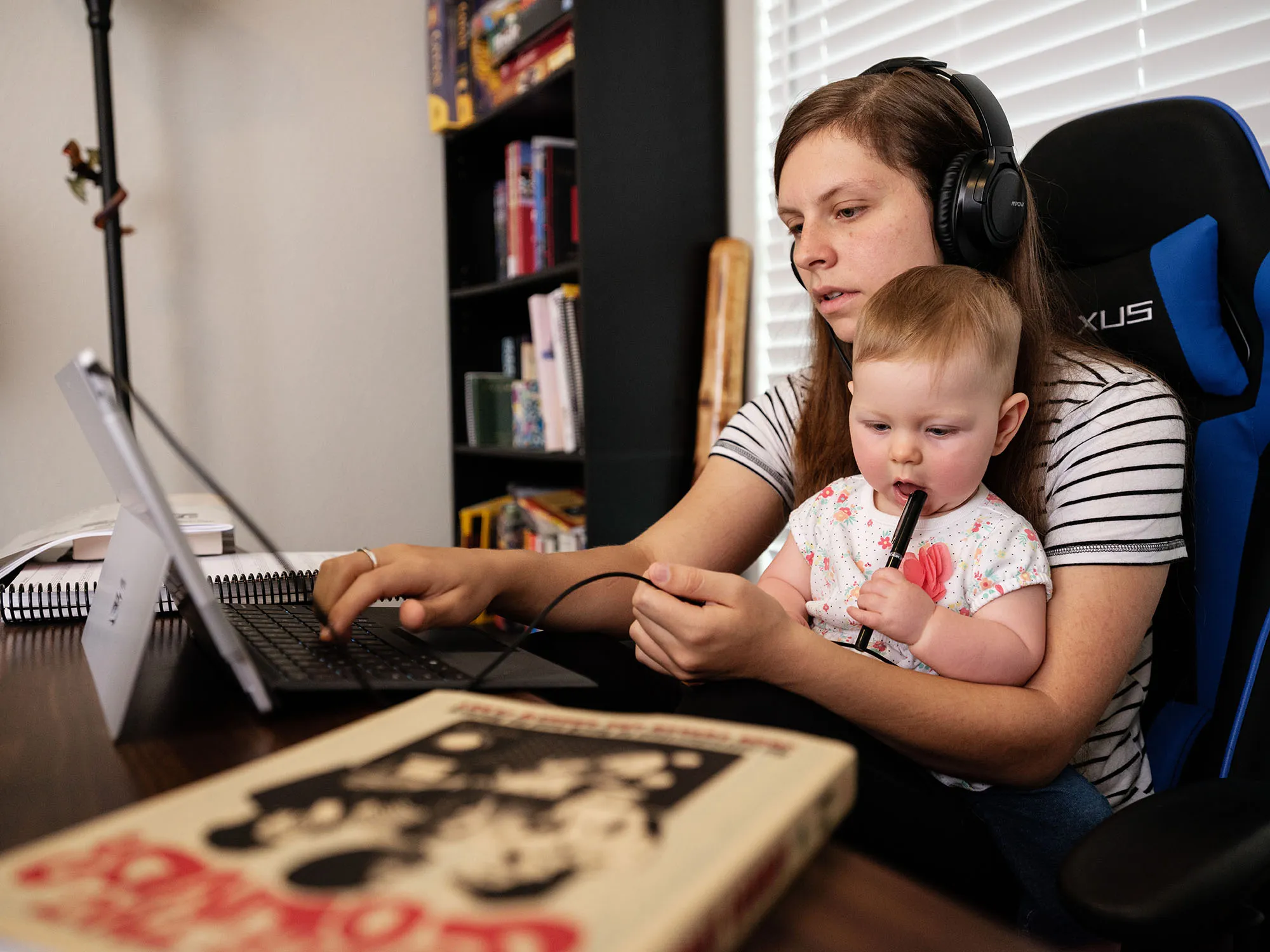
It’s early Tuesday morning on August 25th, 2020. Heather Couture’s husband is standing at the door of their Austin home, bags packed, ready to go. But Heather isn’t ready. There’s something she must do first. She pulls out her phone and emails her Butler School professors saying she’ll miss the first day of classes tomorrow. Heather is going into labor.
She and her husband arrive at the birthing center at 8 a.m. With no epidural, Heather spends the next 15 hours in labor. Finally, a beautiful baby girl, Daisy, is born.
Many women told Heather that childbirth is magical; that once it’s over and you hold that little bundle of sunshine in your arms for the first time, the trauma from hours of grueling labor melts away. In this moment, however, Heather cannot relate. “It was honestly much worse than I ever could have imagined,” she said. “My husband was like, ‘she’s so beautiful, this is such a wonderful moment,’ and all I could think was, ‘I’m exhausted and this is over, let’s go home.’”
Entering her third year as a doctoral student in ethnomusicology at the Butler School, Heather knew balancing the rigorous program with a newborn would be tough. Ethnomusicology, broadly speaking, is the study of music through the social and cultural lenses from which it is produced. Heather knew the workload would be heavy, but she was optimistic in January 2020, when she got pregnant.
Then the pandemic hit.
That meant none of the activities Heather looked forward to in pregnancy: no shopping for baby clothes with her mother, no questions from strangers about the due date or possible baby names, and no one rubbing her belly. “Which is maybe a little inappropriate, but at the same time, as a pregnant woman you feel like an outsider because you’re so abnormal, and those rituals help you feel like you’re part of society,” she said.
A natural extrovert, Heather struggled with quarantine. Before the pandemic, she and her husband regularly invited friends over for board games. But Heather was worried about the virus’ potential harm on pregnant women, so she never left home; she didn’t see anyone besides her husband.
There were things to do around the house: books to read, a dissertation prospectus to write, but Heather couldn’t bring herself to do anything besides binge The Great British Baking Show on Netflix. Just getting out of bed before noon was a monumental task. “I just didn’t want to deal with the world,” she said.
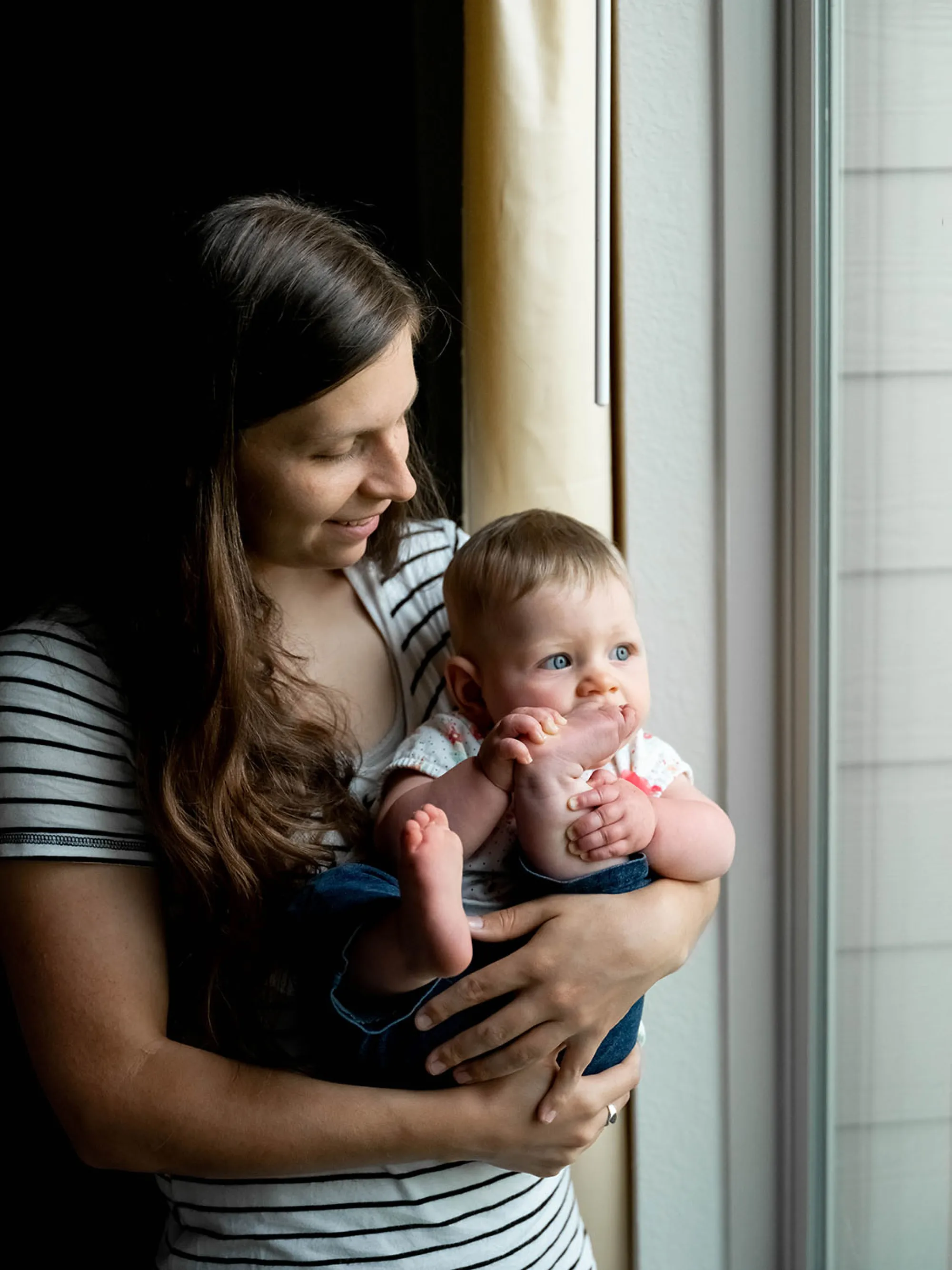
But with her husband’s support coupled with the excitement of finally meeting her baby, Heather made it to August 25th, Daisy’s birthday. She and her husband agreed that since he earned money for the family, childcare responsibility would rest heavily with Heather.
In an ideal world, Daisy would have arrived on time. Just one week, that’s all Heather wanted––one week of rest and intimate time with her first child before school started. But as fate would have it, Daisy came six days late on the eve of the first day of school. Heather notified the Butler School that she needed a few days off to recover. So, the following Monday, exactly six days after giving birth, Heather hopped on Zoom with Daisy in her lap for her first class.
Maybe it was the contrast of a male-dominated class, deepened after an experience so unique to women, or perhaps it was the several hours of sleep she lost the previous night due to Daisy’s crying; whatever it was, Heather felt off. She tried to participate in the class discussion, but she couldn’t articulate. “I was trying to be eloquent, but I felt like I was fumbling around like an idiot,” she said. But as Heather would find out, classes were the easy part. She could put her mic on mute while Daisy sat in her lap during lecture.
The parenting books she’d read said the baby’s naptime––usually a couple hours sporadically throughout the day––is an opportunity to get work done. But Daisy only slept 10 or 20 minutes at a time. “She always wanted to be with me,” Heather said.
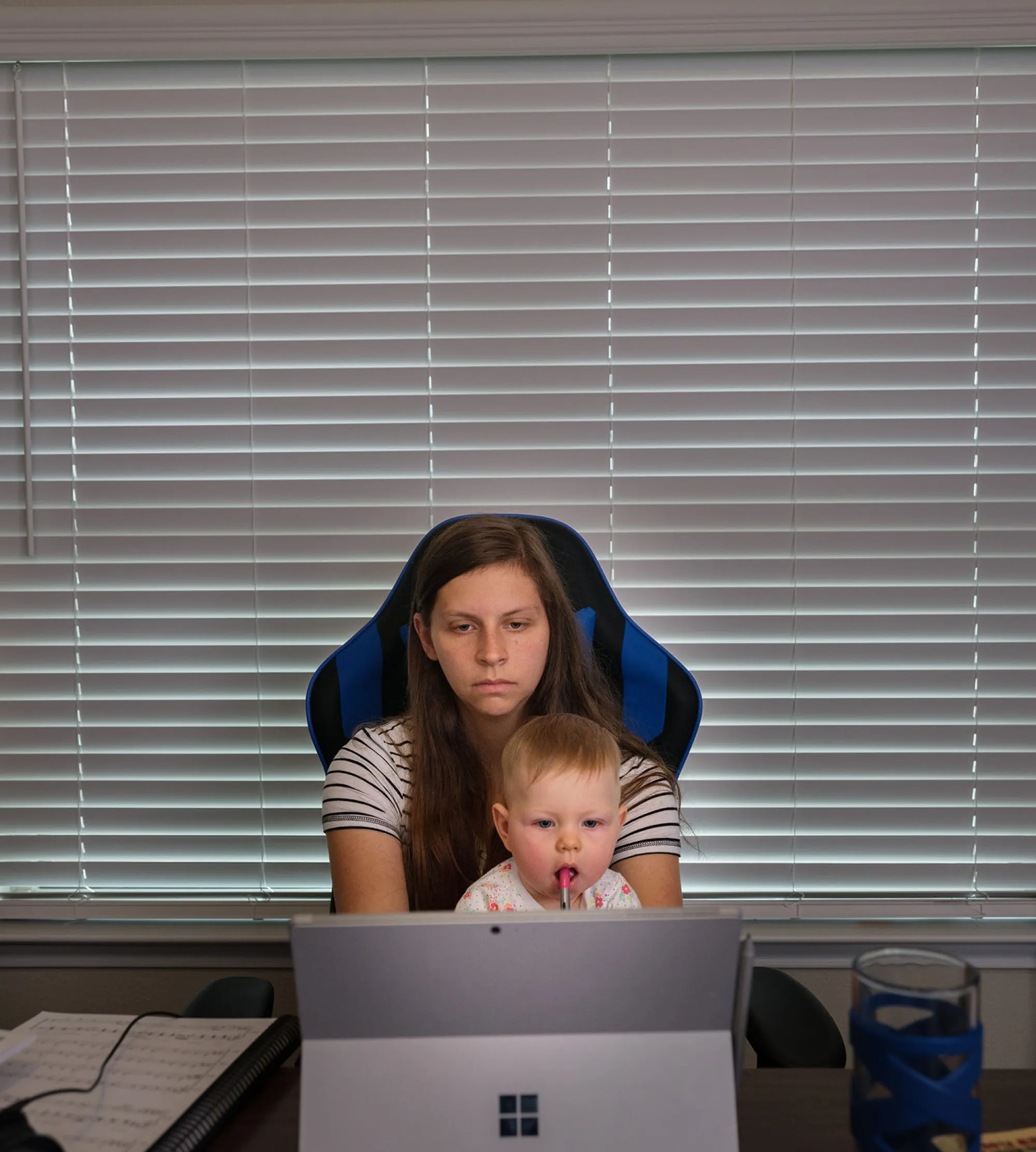
Daisy constantly needed to be held; she always wanted to feed, but Heather needed to work. Ethnomusicology students do a lot of reading and research, and Heather said it takes her 20 minutes to “get into the zone” when studying, something she simply couldn’t do. She had already been experiencing impostor syndrome before Daisy, now that feeling “built and built and built” with each class she felt ill-prepared to attend.
On top of that, Heather still didn’t know how to be a mother. She was learning on the fly––alone. Were it not for a pandemic, she would have invited her mother, who lives in Austin, to watch Daisy and listen to parenting tips; she would have attended new mother groups and bathed in the energy of shared experience. But Heather couldn’t do any of that. Day after day, it was just her and Daisy and mounting piles of schoolwork.
There was some respite from the struggle, though. Heather recalled the very first time Daisy smiled. They were sitting on the couch together as Heather tried to imitate the intro to a heavy metal song called Down with the Sickness by Disturbed. At first, Daisy simply sat with a look of amazement, then, suddenly, she broke out into incredible peals of laughter. Heather started laughing, too, which made Daisy laugh even harder. “It was a moment of pure joy,” Heather said.
And in her Foundations of Musicology class, Ethnomusicology Professor Luisa Nardini, who taught the course, frequently acknowledged Daisy at the beginning of each class, something Heather found quite rare, yet incredibly meaningful. “I certainly didn’t do it on purpose, but it just came up naturally,” Nardini said. “A baby is such a beautiful thing, such a miracle of nature.”
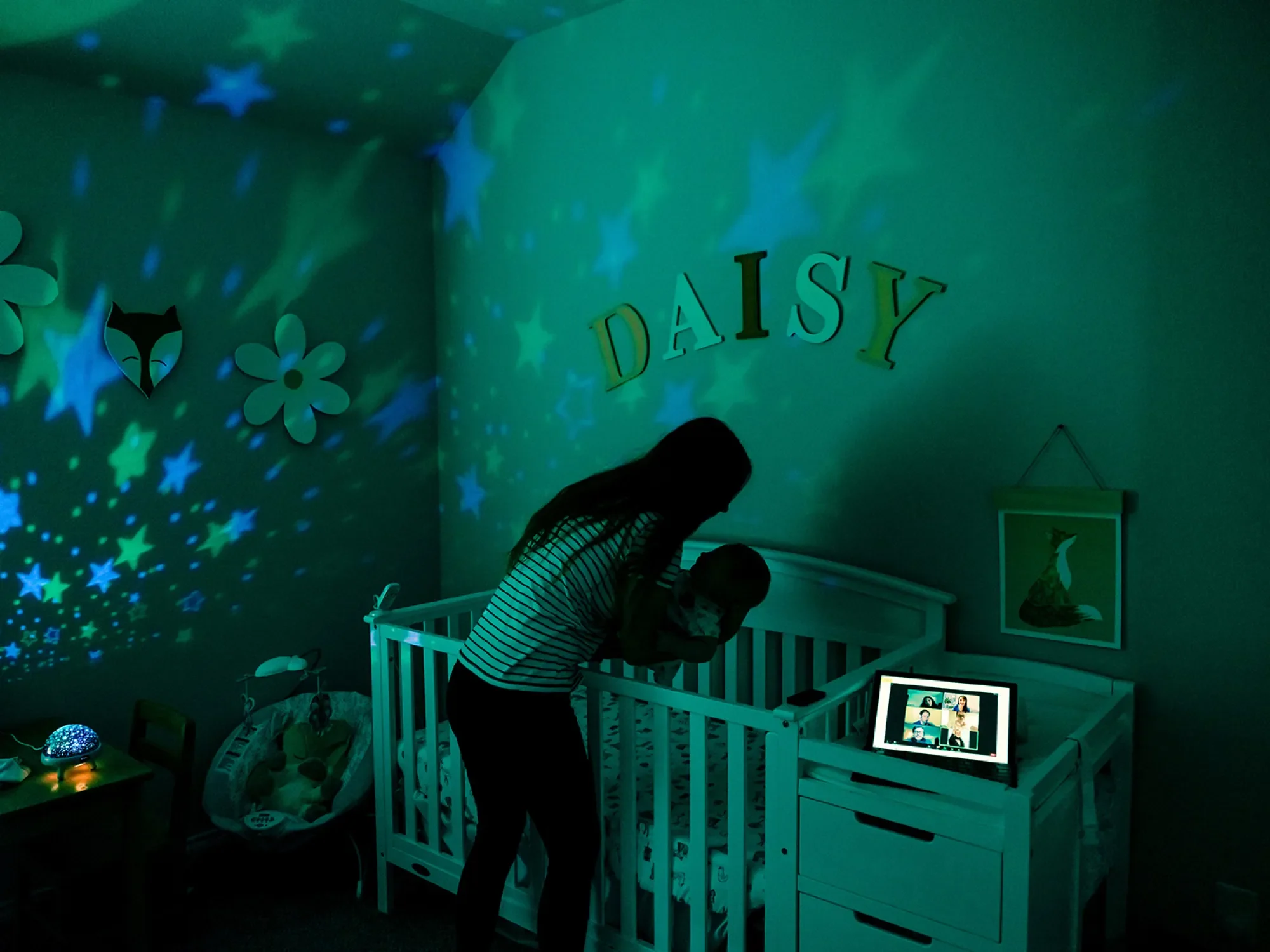
To Heather, locked in a world of isolation, a simple acknowledgement meant everything. “I got to share this child that I had created with people, even though it was virtual,” she said. “That was so amazing.”
Nardini, who gave birth to her first child while in graduate school and her second child while searching for teaching jobs, knew some of what Heather was going through. “I remember writing her an email saying you’re going to have a variety of feelings, and they’re all legitimate,” Nardini said.
But Heather’s feelings were at times overwhelming, and as the semester dragged on, guilt set in. The pull came from both sides and she felt as inadequate as a mother as she did as a student. Heather felt awful that all she could think about was school while Daisy cried for her attention, which was often. The issue wasn’t so much the crying itself, but that Heather couldn’t make it stop. “I would change her diaper; I would feed her; I would try putting her to bed; I would hold her, and yet she would still cry,” she said. Time and again, around they went: Daisy cried, Heather tried everything, Daisy cried louder. Eventually, it got to Heather. She felt angry––first at Daisy, then herself.
“I would think, ‘why are you so stupid not knowing what this baby needs?”’ she said.
It culminated one evening when Heather was making enchiladas for dinner while her husband was out grocery shopping. She had mastered the art of cooking with one hand while holding Daisy with the other, but enchiladas required a lot of chopping and sautéing––more of a two-handed task. So, Heather placed Daisy in her highchair facing her. Before long, it began; that sound that Heather heard over and over and over again. She began pleading with her baby: “please stop crying Daisy, please, please!” She didn’t stop. “Please Daisy, I don’t know what you want, please stop crying!” The crying continued. So, Heather did what any mother who had been locked in her home for months while raising a newborn and enduring grad school without a moment’s rest amidst a global pandemic might do: she started screaming and crying, too.
“My feeling in that moment was just, breakdown. I literally started screaming because I didn’t know what to do,” Heather said. Eventually, her screams retreated into gentle sobs. Her husband came home and took Daisy to another room while Heather composed herself.
She survived the semester, but it took a toll. Heather knew something had to change. So, she sat down with her husband over winter break to renegotiate childcare duty. They agreed that he would watch Daisy for three hours every evening so Heather could catch up on schoolwork. She taught him how to feed Daisy with a bottle in case she got hungry, meaning Heather had a few uninterrupted hours of alone time each day.
While the spring semester was still difficult, Heather said she got into a better “groove” as a full-time student and mother.
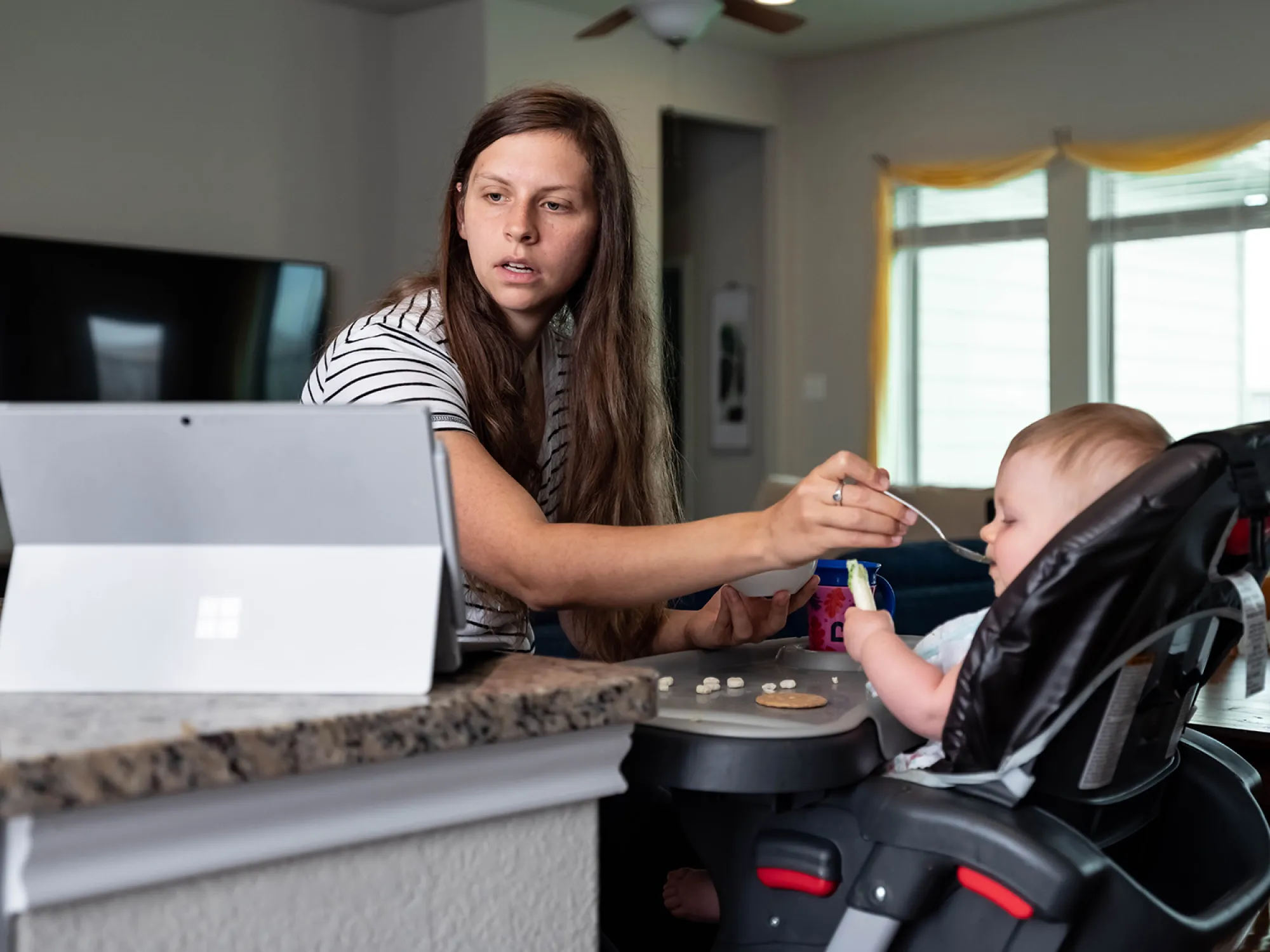
She became more comfortable speaking in class, too. In fact, one day Heather casually changed Daisy’s diaper in her Foundations of Musicology class while leading a group discussion about a chapter in Susan McClary’s book, Feminine Endings (she tilted her camera up to spare everyone the details). “In that moment I really understood how much she was juggling,” Nardini said. “The discussion was so professional and so well done, I really had a lot of admiration for her.”
This winter, Heather is heading to China to research her dissertation on a traditional instrument called the lusheng, a long-time symbol of Miao and Dong heritage in China. She’ll be exploring the ways in which the instrument has been decontextualized from a symbol of Miao life, festivity, and individualism, and recontextualized in recent years as a symbol of the booming tourist economy. Heather plans to take Daisy along and is hoping her husband can come for a week to visit, too.
And while the challenges at times have seemed insurmountable, Heather said she’s in a good place. “Having Daisy was certainly the hardest thing I’ve ever done, but it has also been the most joyful, fun, and fulfilling thing I’ve ever done, too.”
And while a year off might have allowed for a smoother adjustment, Heather said she’s grateful she was able to get through it and finish her course work, and thankful for Butler School professors like Nardini who helped her navigate this unusual year. Now, Heather is set to graduate in two years and can focus solely on her dissertation and, of course, Daisy.
“I’m so glad I’m still on track,” she said. “Daisy knows me, she knows my husband, and everyone in the musicology department knows her because she zooms into every class with me. My little ethnomusicologist.”
A Strange First Year from Ohio
How Margarita Denenburg Balanced Online Teaching, Two Young Children and No Live Music While Starting Her New Job with the Butler School.
For Margarita Denenburg, playing piano isn’t a luxury, it’s a necessity––like breathing. She needs it to stay centered. Having moved to Israel from Russia at age nine, the only times Denenburg can recall separation from a piano were during her mandatory military service following high school over two decades ago, and after the birth of her first child.
“But even that wasn’t prolonged because my husband, who knows me so well, he pushed me out the door,” Denenburg said. “He’s like, ‘you have to go practice.’ It’s almost like taking antidepressants.”
But when Denenburg started her new position as associate professor of practice in piano pedagogy at the Butler School of Music in fall 2020, the job was temporarily remote, so she stayed in Ohio where she lived with her husband and two young children. Denenburg moved her piano out of her old office at Heidelberg University into her living room, but with a demanding new work schedule and a husband and two young kids all quarantining in the same house, she couldn’t find time to play. It made her feel off.
“Piano is something that keeps me sane,” she said. “I’m going to start crying now just thinking about it.”
It was just one obstacle from an unusual first year on the job. Denenburg’s new role at the Butler School came with three major responsibilities. First, she would teach piano pedagogy (the study of teaching piano playing). Second, she would direct the Piano Project, a program that matches pedagogy students with K-12 pupils in Austin. Third, she would teach and oversee class piano, a course all undergraduate Butler School students majoring in performance take, regardless of instrument, in order to graduate.
Piano Project was founded nearly three decades ago by Denenburg’s predecessor, Sophia Gilmson, an internationally acclaimed classical pianist who is now a UT Austin emeritus professor of piano pedagogy. The program is designed to give pedagogy students practice teaching.
For those Butler School students who came in last fall with no prior teaching experience, Denenburg said she felt for them. Teaching piano is hard enough in person, but Zoom adds additional challenges.
“The kids don’t actually have to listen to you,” Denenburg said. “Like, they can just leave the room.”
But Denenburg had help from a strong group of teaching assistants. The Piano Project’s student coordinator, Martin Kesuma, a doctoral student in musical arts who graduated last spring, did all the administrative work and took on additional students without being asked.
“The amount of extra hours he put in just out of his own goodwill, I mean, he’s just an unbelievable person,” Denenburg said.
But Kesuma also acknowledged that teaching piano through Zoom is taxing. One day, he was so excited to finish virtual lessons for the week he immediately closed his laptop after class, rose from his desk and darted across the room. He leaped up onto the bed hitting his right pinkie toe on the frame and breaking it in the process.
In addition to Kesuma, Denenburg had support from her predecessor, Sophia Gilmson, who made herself available to share the wealth of knowledge she accumulated over the years. Gilmson even filled in for a few virtual guest lectures.
“I shared as much as she wanted and perhaps even a little more than she wanted,” Gilmson said with a smile. “And I told her it can only get better from here.”
While Piano Project was a monumental task in itself, Denenburg was also responsible for class piano.
All Butler School students, regardless of instrument, are required to learn basic piano skills. So, they take class piano, which consists of six teaching assistants with about 16 students assigned to each in a separate class. Denenburg also teaches her own set of 16 students while overseeing her TA’s classes.
Like piano pedagogy, teaching piano in person is hard enough, but Zoom makes it harder, particularly because students can’t play together synchronously. “That’s the killer,” Denenburg said.
But Denenburg said students were generally happy with class, which she attributed to her constant cycle of applied feedback. Each week, Denenburg sent her students a survey asking them what they liked about class and what they’d like to improve. For instance, at the start of each class, Denenburg reviewed scales with her students as a group. But two students indicated in a survey that they wanted to review scales individually, so Denenburg started giving them the option. They could stay on and review scales together with the group, or turn their cameras and microphones off to review them individually. “I learned to be extremely flexible,” Denenburg said.
And while Denenburg was sprinting to keep up with work, in Ohio she was missing the energy and camaraderie of working alongside colleagues. She wasn’t entirely alone, however. Marjorie Yankeelov, lecturer in music and human learning at the Butler School, reached out and befriended Denenburg early on.
“I like for people to feel like they belong instantly,” said Yankeelov, who was on the search committee that hired Denenburg. “That’s how I would want to feel.”
Yankeelov said she learned how to include people at a young age having spent many summers at camps.
“It was always encouraged to find the person who’s lonely and be their friend,” she said. “So, if you’re with a bunch of people it’s great, and it feels good, so wouldn’t it also feel great for that other person if you invited them in?”
In addition to discussing work, the two connected on a personal level. Both have young children, and they discovered that Yankeelov’s son and Denenburg’s daughter are attending the same Austin school in the same grade this year. That’s because Denenburg, like Yankeelov, preferred to live close to campus and found a home nearby. But house shopping in a competitive Austin real estate market from Ohio was tough, so Denenburg at times leaned on her new friend for help.
“There was one time she called me, she was like, ‘can you just drive by this house that’s for sale and take a photo and send it to me?’” Yankeelov recalled with a laugh.
And while all this was happening--work, remote house shopping--during the fall semester Denenburg had a full-time working husband and two young daughters to care for at home. She felt like she was constantly sprinting, pulled between work and parenting duties. And because her youngest daughter was only two, Denenburg had to prioritize her.
“I can’t tell my two-year-old, ‘I’m sorry honey, I have to teach a piano pedagogy class,’” Denenburg said. “My husband and I are not big fans of screen time, but it got to a point where it was just like whatever, let’s just survive this.”
What’s more, before the pandemic, Denenburg and her family did “Thursday night classics” as they called it. Each week as a family they gathered in the living room to watch a recital, whether it be piano, violin, ballet or orchestra. When the pandemic hit, they subscribed to the Cleveland Orchestra so they could continue the family tradition by tuning in to virtual performances. It worked for a while.
“But after a few months, I was like, I just can’t do this anymore,” Denenburg said. All the time on Zoom caused her to feel burnout.
It wasn’t easy, but Denenburg made it through her first year working entirely remote. Over the summer, she moved into her new Austin home with her family. Now, Denenburg said she’s looking forward to performing and attending concerts in person.
“Give me back my soul! I want music, I want lots of it,” she said. “I want to be able to play again. I want to collaborate. I want to play duets.”
The Final Act
How One Voice Student with Autism Conquered His Senior Year.

Nicholas Ryland has never been one to back down from a challenge. Diagnosed with Asperger Syndrome (a form of autism) as a toddler, doctors told his parents he would likely never speak. Unconvinced, they enrolled him in an intensive program of occupational, behavioral and speech therapy, at times as much as 50 hours per week. It worked, and as Ryland aged his speaking turned into singing.
His love of music, which expanded into playing instruments in addition to singing, drove him all the way through the Butler School of Music where he graduated last spring with a bachelor’s degree in vocal performance.
But the final year of mostly online learning was tough. While university students around the globe struggled to adapt to a year of remote learning, Ryland said his transition was especially difficult. “Being a kid with this diagnosis, it hit different,” he said.
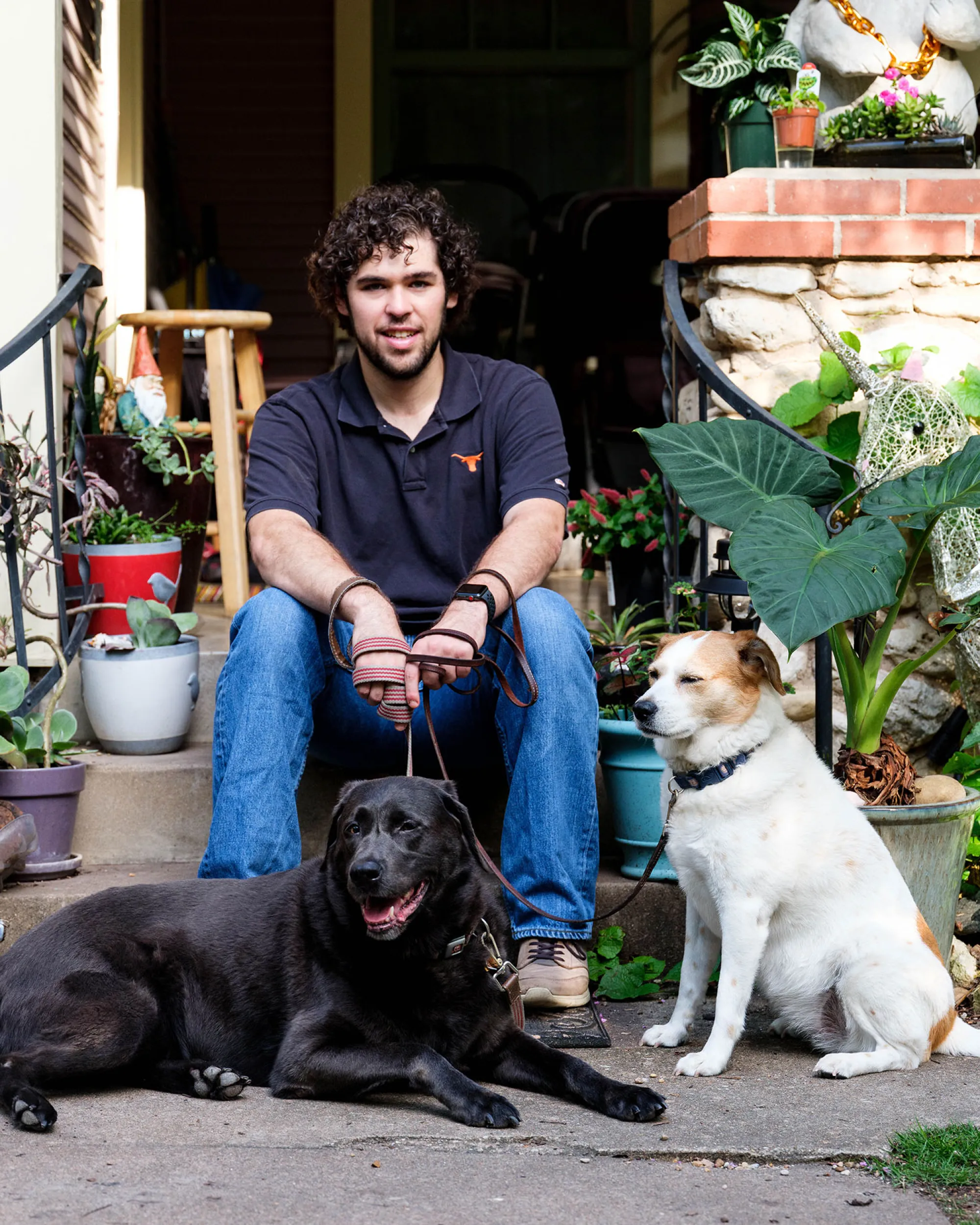
Ryland said he realized the pandemic’s seriousness after his family’s vacation was cut short during spring break, 2020. After the flight back, they quarantined for two weeks. Ryland said he was “glued” to his laptop the entire time, watching YouTube videos and bingeing Kim’s Convenience on Netflix. When school returned online, Ryland said he found it more difficult to ask for help in class. He also missed learning simply by chatting and sharing ideas with classmates.
Perhaps most importantly, he missed singing in groups. Vocal performance students like Ryland participate in ensembles, which he always viewed as an “oasis” from coursework, but those were fewer and less frequent amidst the pandemic. Moreover, Ryland missed his part-time job at a local church where he’s a section leader for the adult choir. “It was like adding salt to a wound,” he said.
Even before the pandemic, Ryland’s musical journey wasn’t always easy. Ever since he could remember, Ryland said his developmental disorder has caused frequent misunderstandings, and it still sometimes inhibits his ability to connect with others. “I tend to misunderstand things that people say,” Ryland said. “Someone might say something that makes no sense to me and people are laughing at me, and I’m like, ‘why is that funny? I have no idea what that means.’”
Ryland said he also “vents” a lot with acquaintances, which he said is met with varying degrees of compassion. “Some people are just like, ‘hey, that’s cool, but I’m not the person you want to vent to,’” Ryland said. “But then there are people who are actually willing to listen to me vent and then give me suggestions. Those are the kinds of people I tend to talk to the most.”
Tamara Sanikidze, director of the Butler Opera Center, which Ryland joined as a sophomore, said his fearlessness in social situations is an asset. Last year, Sanikidze had Ryland in class for a virtual opera seminar. She hosted many prominent guests––L.A. Opera’s music director, presidents and CEOs of various music academies––and students were sometimes shy in asking questions. “But Nick had no problem,” Sanikidze said. “For every single guest, the first two questions were always from him, and they were always incredibly intelligent.”
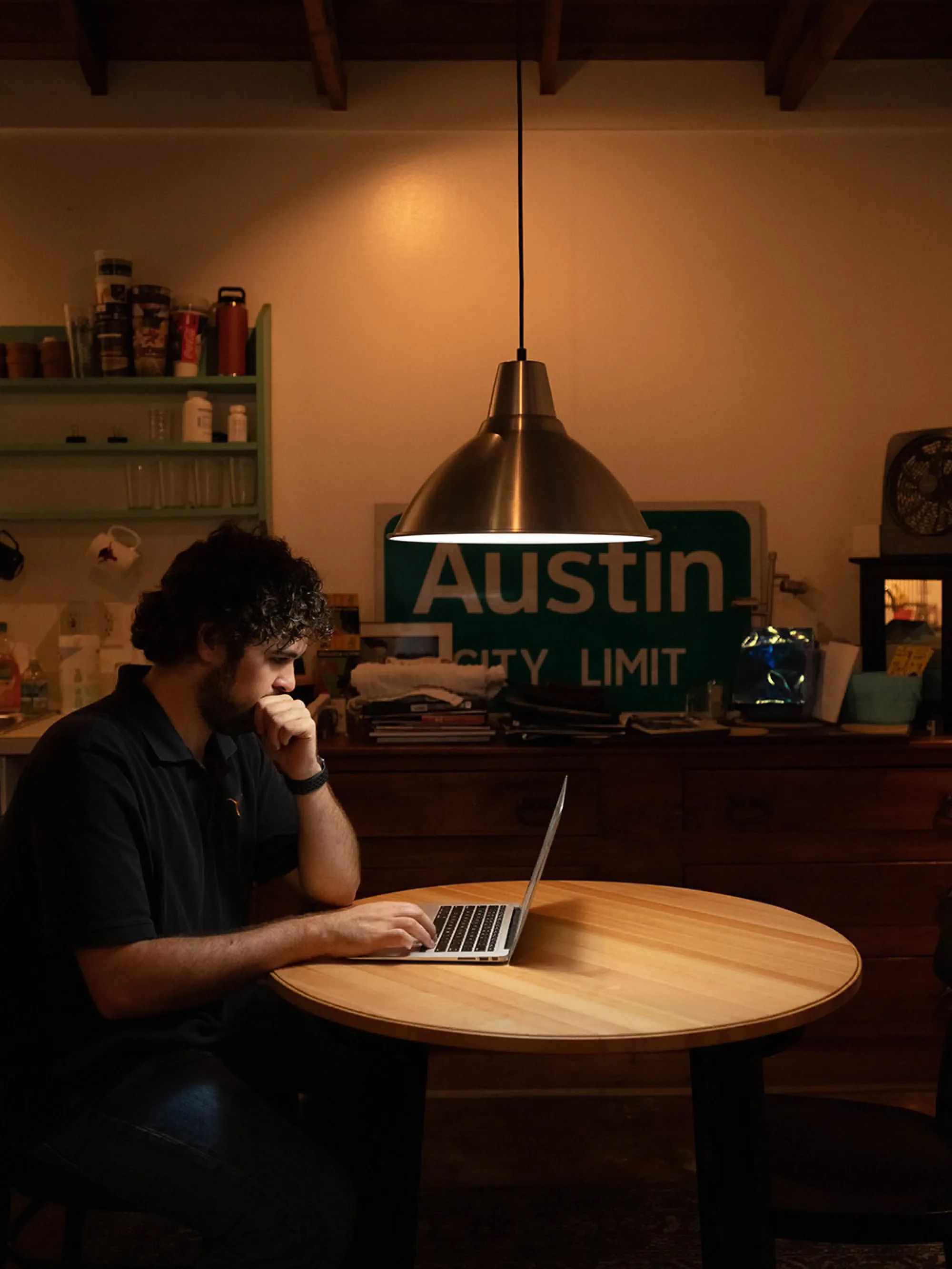
Ryland also participated in a Butler Opera Center one-act opera last spring (with health and distancing precautions in place). Ryland played the protagonist, Janitor Joe, a character that Sanikidze said was based on Ryland.
The production, called Audition Fever, features three “opera divas” trying out for a role. Listening to the auditions while tending to his custodial work, Janitor Joe sings his own aria following the auditions, the only entirely original aria in the production, detailing his life’s struggles and missed opportunities as a young performer. Not only does Janitor Joe have the best singing voice, but he is also the character with moral authority. “Throughout the production, I kept telling the cast that Nick was Cinderella and the other characters were the ugly step sisters,” Sanikidze said. “This role was literally created with Nick in mind, and just watching how he embodied the role and brought it to life was one of the most significant, satisfying moments of my creative life.”
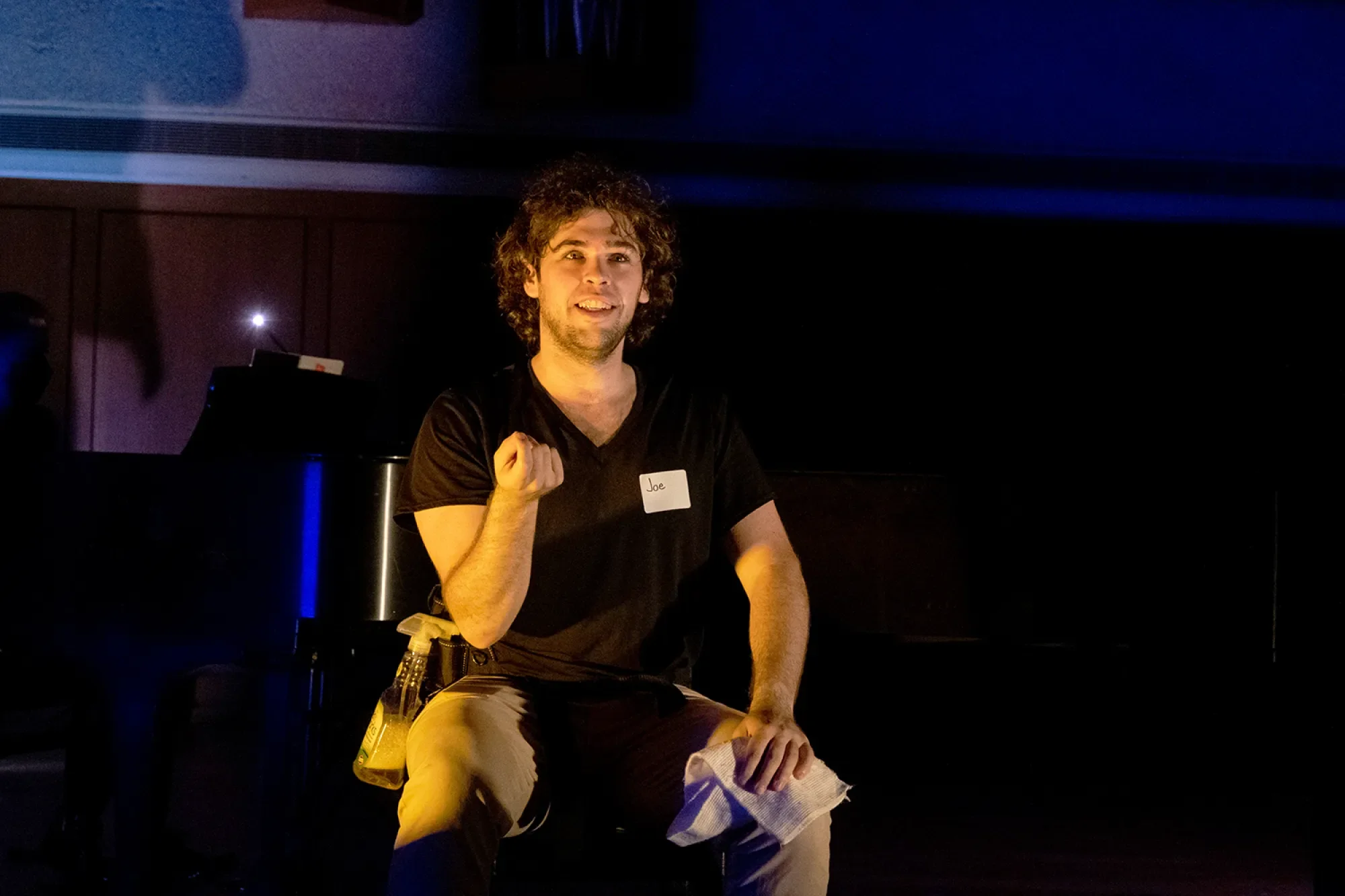
Ryland performs as Janitor Joe, a character based on him, in the Butler Opera Center production of Audition Fever, one of few performances completed during the pandemic.
In addition to his warm relationship with Sanikidze, who Ryland said is “like a mom,” he frequently visited his own family who live across the street from his Austin apartment. Ryland dropped by often during mealtime, for faster Wi-Fi, to help babysit his siblings or just hang out with his dogs.
“Family is important to me and that’s why I’m really close to them,” Ryland said. “And my dogs, even though they’re little brats, they’re always comforting and they always give me a sense of peace.”
Ryland said a year at home caused him to pay greater attention to current events in the U.S., particularly the Black Lives Matter and Stop Asian Hate movements. He said he’s glad those initiatives gained traction, and hopes that those advocating for people with development disorders like his will receive similar attention. “We’re all human and we deserve the same kind of respect and the same kind of sympathy and attention that anyone else would get,” Ryland said about those with developmental disorders. “Asperger Syndrome is getting a lot of awareness in recent years, but I feel like there’s a lot more that could be done in advocating for it.”
Now graduated, Ryland said he’s looking for performance opportunities and focusing on saving for graduate school. And while Ryland is both excited and nervous for the next chapter, he said his time at the Butler School was unforgettable. “I’m thankful for every minute of my four years at a campus that values community support. I’m disappointed to have to move on, but I’m grateful for everyone who helped me get to where I am right now,” Ryland said. ▣


